Natural headache remedies? They’re probably in your kitchen.
So many things can make your head ache: Deadlines, arguments, irksome bosses, traffic jams—the list goes on and on. Even good things can give you a pain in the head—for example, “ice cream headaches” (AKA “brain freeze”). Generally speaking, headaches are the body’s response to physical or emotional stress. That stress can make the muscles in your head and neck contract, creating tension headaches. Another example: alcohol can irritate and expand blood vessels, like in a hangover headache, according to the National Headache Foundation. Despite the discomfort, some headaches may respond to do-it-yourself natural headache remedies. Check out this guide to figure out what kind of headaches you usually get—and how to get rid of them.
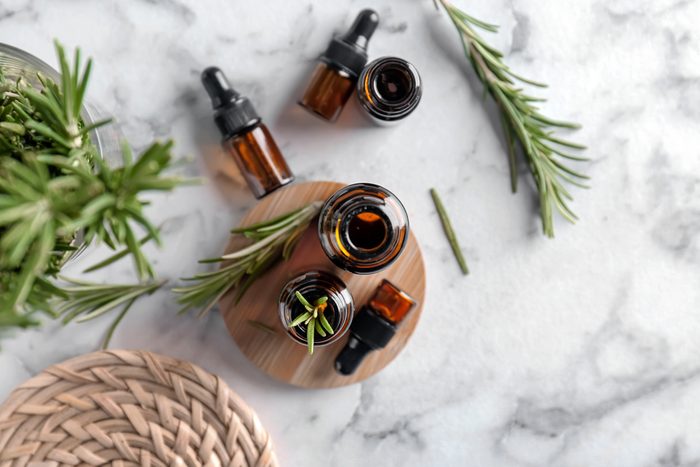
Natural Headache Remedies: Use lemon essential oil
To relieve headache pain, you can consider using an aromatherapy essential oil. While there isn’t a lot of research on these oils for headaches, the Mayo Clinic says their experts sometimes recommend lemon essential oil, as the scent may ease the pain. Here’s a guide to essential oils you should read before using them.
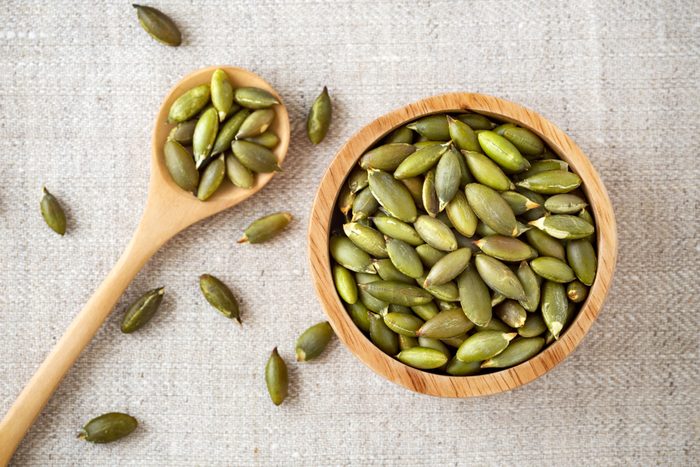
Natural Headache Remedies: Take magnesium
Headache researchers say that migraine sufferers should keep this essential mineral in their medicine chests. More importantly, they should take it daily. According to a 2018 review in the journal Headache, taking 600 mg daily of magnesium may help reduce one’s number of migraine attacks. Note: Magnesium may cause diarrhea in some people. You can get magnesium from food sources, too. Magnesium is high in foods like pumpkin seeds, mackerel, dried figs, and dark chocolate.
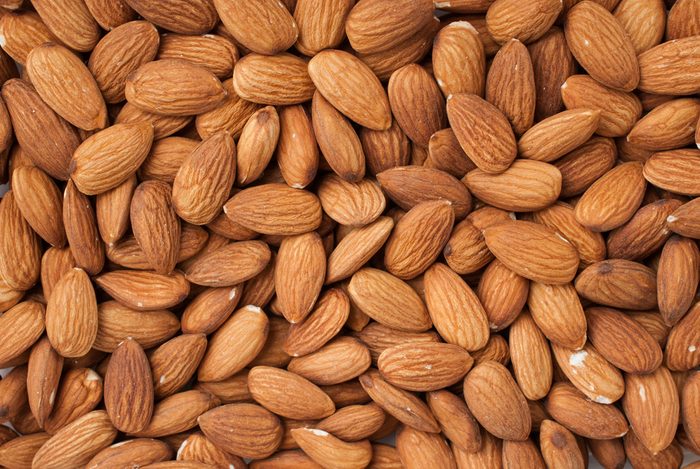
Natural Headache Remedies: Get more vitamin B2
Taking riboflavin, a B vitamin, may help you get two fewer migraines per month, according to the US National Library of Medicine. If you’re a migraine sufferer, you know that’s a big deal, as attacks can greatly reduce your quality of life and steal an entire day away from you–or more. Almonds, sesame seeds, certain fish, and some hard cheeses are high in this vitamin. Here are some other proven remedies for migraines.
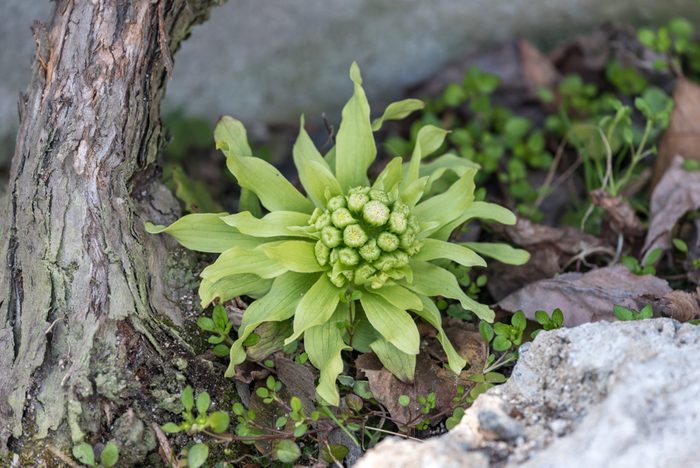
Natural Headache Remedies: Try butterbur extract
An herb called butterbur has proven so effective for migraine relief that physicians who specialize in treating migraines often recommend it. One to look for: Petadolex, an over-the-counter butterbur extract, which is safe and effective, per a 2018 review in Cephalalgia Reports. The recommended dosage is taking 50 milligrams three times a day. These are some causes of migraines you should be aware of.
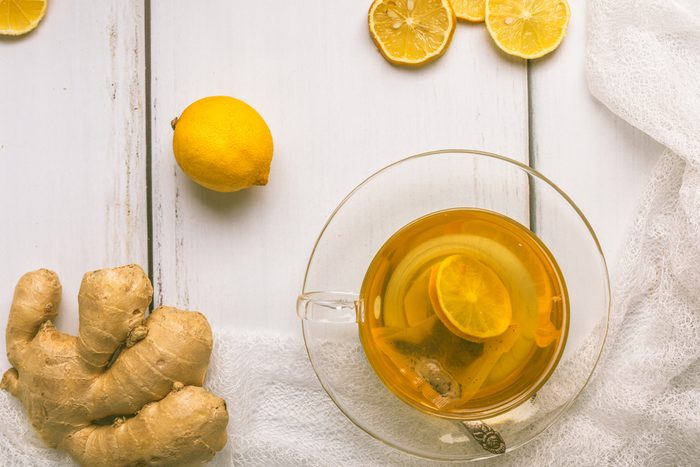
Natural Headache Remedies: Steep ginger root tea
Ginger is not a slam-dunk, but it may act like sumatriptan (a common prescription drug for migraines) to stop an attack, a 2018 paper in Evidence-Based Practice says. Create a homemade tea: 1. bring water to a simmer; 2. peel and slice three quarter-sized slices of ginger root; 3. place ginger in 2 cups of water; 4. cover for 30 minutes. When it’s sufficiently cool, drink it alone or with a slice of lemon. What’s more, ginger helps quell the nausea that often accompanies migraines—you can use ginger for a whole host of health benefits.

Natural Headache Remedies: Brew chamomile tea
Chamomile tea is known for its calming properties. If stress is setting off your migraines, include activities into your day that help relax you. Brew up a cup: 1. bring 1 cup of water to a boil; 2. add one chamomile tea bag; 3. cover; 4. let steep. Sweeten with honey, if desired. Take a few minutes to sip the hot tea slowly while sitting in a quiet spot. Don’t miss these other 10 natural remedies for headaches.
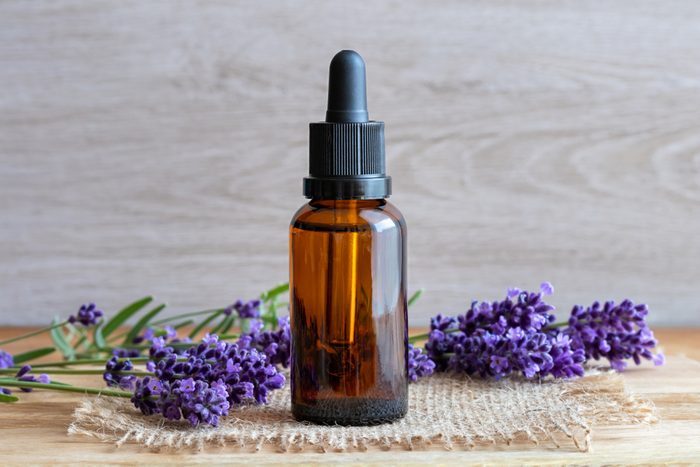
Natural Headache Remedies: Get a whiff of peppermint oil
If you think you have a tension headache and you know you like the smell of peppermint, take a whiff of the uplifting invigorating scent. A Dutch study in 2016 points out that peppermint oil can stop a headache as effectively as aspirin. Apply it topically or put a few drops in hot water and submerge your feet for a comforting treat. The aromatic vapors may provide soothing relief.
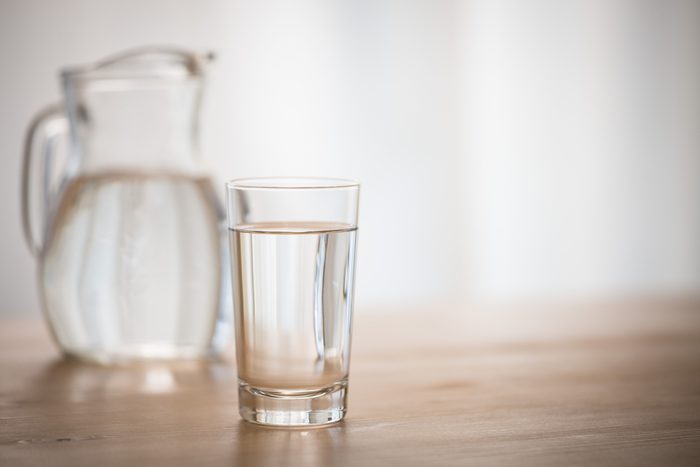
Drink a glass of water
A drink of water might be the simplest and most effective of all home remedies for headaches: “Dehydration leads to the loss of fluid from the brain, which causes it to pull away from the skull and stimulates pain receptors, which can impair your ability to concentrate, make you irritable, and worsen an existing headache,” explains Rashmi Kulkarni, MD, a family medicine specialist at Gwinnett Medical Group’s Covenant Family Medicine in Dacula, Georgia. To avoid dehydration, Dr. Kulkarni recommends drinking enough water (48 to 64 ounces) throughout the day. This is what happens to your body when you start drinking enough water.

Use a cold compress
Just as you’d apply ice to a swollen muscle or an inflamed injury or skin condition, you can ice your aching noggin. “Applying cold or frozen compresses to the neck, head or temples decreases inflammation, slows nerve conduction, and constricts blood vessels, all of which help reduce headache pain,” explains Julie Rosenberg, MD, author of Beyond the Mat. Here’s how to tell whether ice or heat is best for your pain.
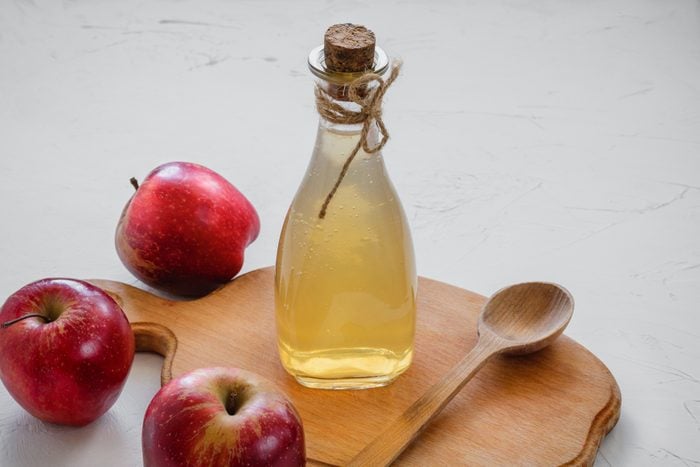
Sip apple cider vinegar
You may have heard of the myriad health benefits associated with apple cider vinegar—including potentially lowering blood sugar levels. As it turns out, drinking apple cider vinegar may also help prevent headaches or migraines, too. “Apple cider vinegar can help prevent migraines caused by blood sugar imbalance,” says David Friedman, ND, DC, doctor of naturopathy and clinical nutritionist. “It’s even thought that inhaling steam vapors of apple cider vinegar may help with sinus headaches,” he says. Dr. Friedman suggests drinking it straight up or applying a cold apple cider vinegar compress to your forehead to soothe a headache. Although there’s no scientific research to back up this remedy, it may be worth a try. Watch out for this negative side of apple cider vinegar.
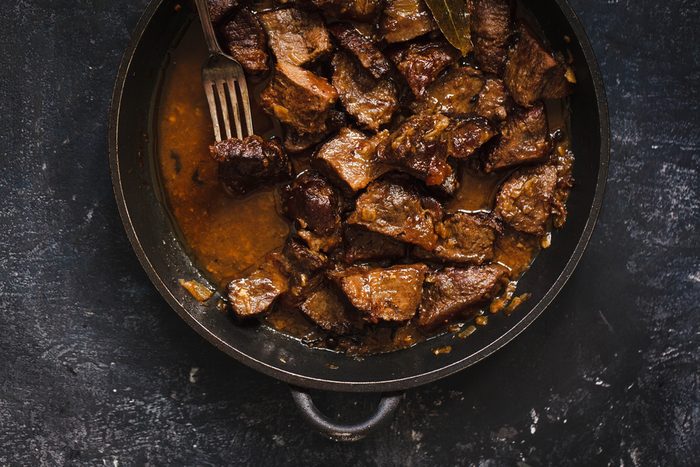
Take coenzyme Q10
This fat-soluble nutrient, which also goes by the name CoQ10, is produced naturally in the body and is found in many of the foods you eat, especially muscle and organ meats. Getting your fair share has been shown to be an effective and natural way to treat headaches, according to Dr. Rosenberg. “CoQ10 acts as an antioxidant, which protects cells from damage and plays an important part in metabolism,” he says. He recommends aiming for 100-200 milligrams a day. Learn more about the benefits of CoQ10.
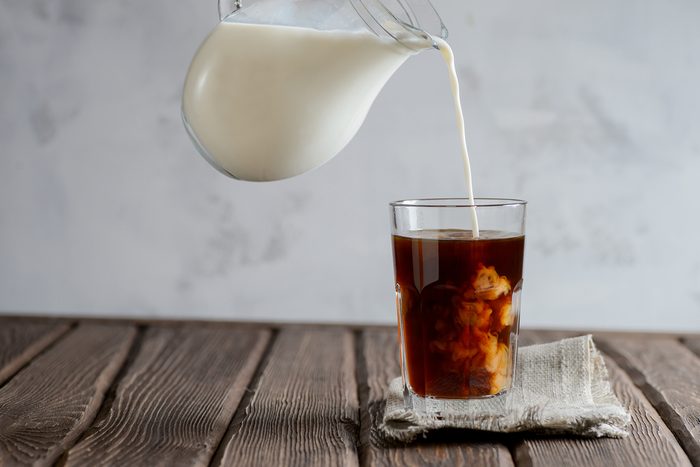
Pour a cup of coffee
Caffeine may be one of the most popular home remedies for headaches. “Before a headache or migraine starts, blood vessels enlarge, but the caffeine in coffee contains ‘vasoconstrictive’ properties that narrow the blood vessels and restrict blood flow,” explains Friedman. “If you decide to take acetaminophen or aspirin for a headache, drinking coffee can increase their pain-relieving effects by 40 percent, which explains why Excedrin contains 65 mg of caffeine in each tablet,” he says. Here’s how to make your coffee habit healthier.
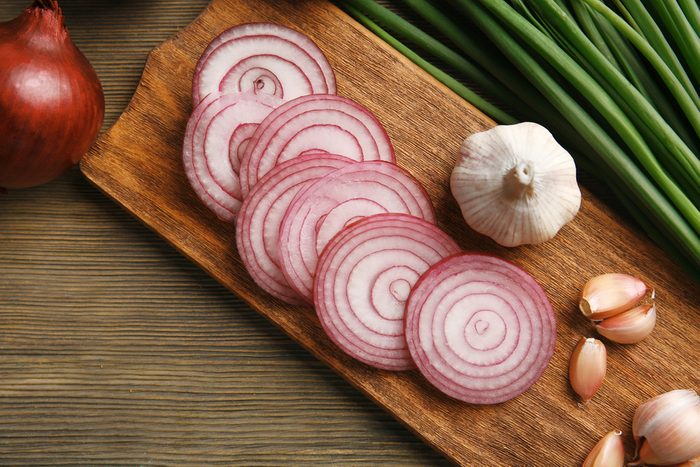
Eat foods with garlic and onion
While they certainly don’t make for an ideal first-date meal, garlic and onions are great remedies for headaches, says Lynn Anderson, PhD, ND, a naturopathic doctor and yoga therapist in Los Angeles. “Additionally, both garlic and onions are recommended for preventing heart attacks,” she adds. Check out these little-known uses for onions.
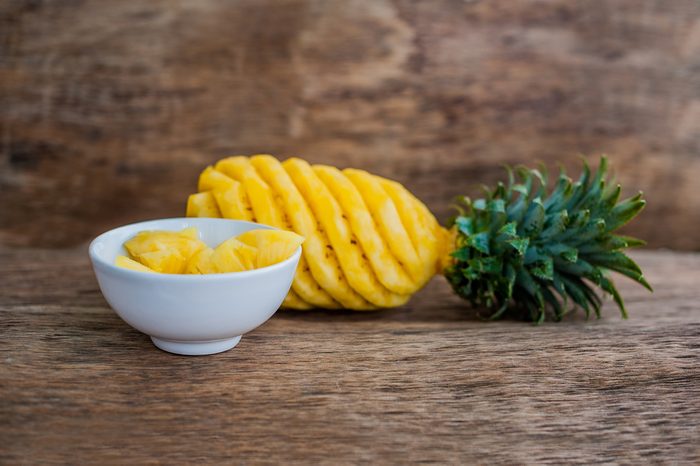
Slice up some pineapple
Not only is it delicious, but fresh pineapple may be a great headache remedy. “It contains a natural proteolytic enzyme called bromelain, which has pain-relieving and anti-inflammatory properties,” says Friedman. “Bromelain also lowers the production of TGF-β, another contributor of inflammation associated with migraines.” If you’re not a fan of pineapple, he recommends taking a bromelain supplement, which is available at most health food stores. There’s no scientific evidence that bromelain helps headaches, but it may be worth a shot.

Steep feverfew tea
It might not be the most popular tea, but feverfew tea is one of the more effective remedies for naturally reducing headaches. “This flowering plant works by limiting the production of prostaglandins, the brain chemicals responsible for contracting blood vessels, which can lead to intense throbbing pain at the back of the head,” explains Friedman. “Feverfew also contains anti-inflammatory and muscle-relaxant properties, which are beneficial for those suffering from headaches or migraines, and has been shown to reduce the severity of nausea and vomiting for migraine sufferers,” he says. You can find feverfew as a tea, tincture, or in capsule form at most health food stores. Learn more about the headache-relieving perks of feverfew.
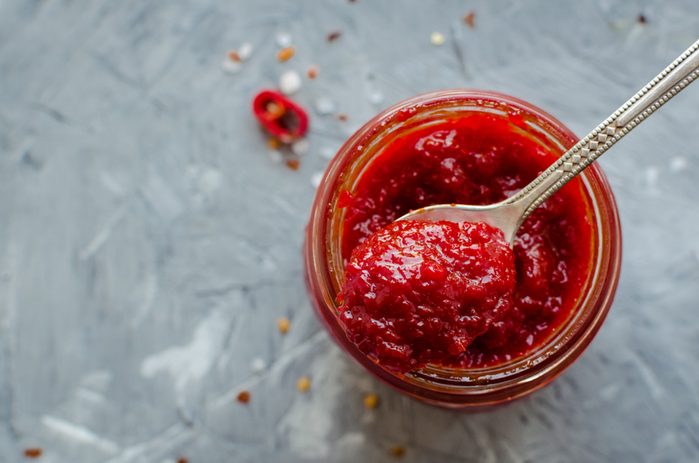
Eat spicy foods
If you’re already a fan of hot sauce or spicy cuisines, great: Filling your plate with hot-pepper–containing foods is among the top home remedies for headaches. “Hot peppers (chilies) contain a substance known as capsaicin, which is a natural ingredient found in many topical pain-relief creams and ointments,” says Friedman. “Capsaicin has the ability to decrease substance-P, a chemical messenger that carries a signal to the brain that it translates as pain.” When you effectively block the messenger, he explains, you block the pain too.
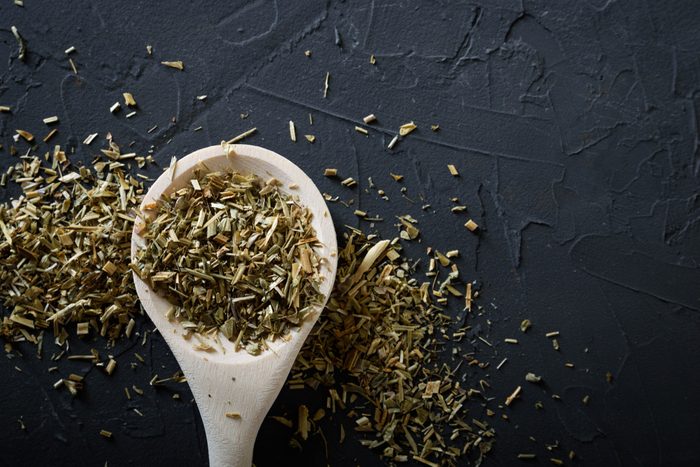
Season your food with oregano
This wonderful culinary herb may also have impressive medicinal properties—including pain relief, according to Anderson. “If you’re not a fan of the flavor, you can use oregano oil in a diffuser, or you can put a few drops on a tissue and hold the tissue to your nose,” she says. You can also combine oregano oil with a carrier oil and apply it to the temples, Anderson adds. Learn more about the impressive health benefits of oregano oil.
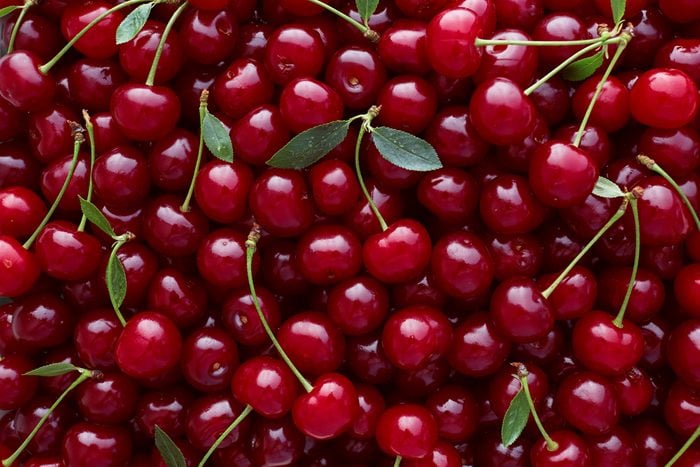
Eat some cherries
Friedman explains that cherries help reduce inflammation in the body by neutralizing some of the free radicals that we’re exposed to in our environment. “Anthocyanins, a type of bioflavonoid that gives cherries their deep red color, have anti-inflammatory properties similar to those in aspirin,” he says. Eating a dozen cherries may help relieve a headache and also help remedy joint pain and ease PMS symptoms, too, says Friedman. Here are more antioxidant-rich fruits you should be eating.
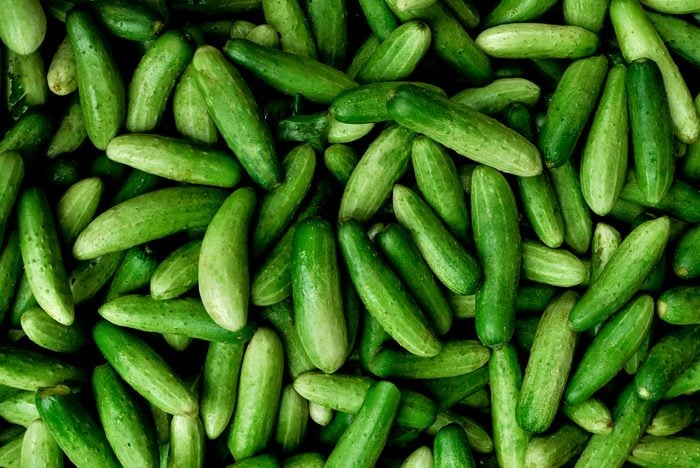
Snack on cucumbers
As cucumbers are 96 percent water, they’re an ideal snack for alleviating any headache caused by dehydration. In addition, Friedman explains, cucumbers are packed with nutrients that play a vital role in hydration, like magnesium and potassium.

